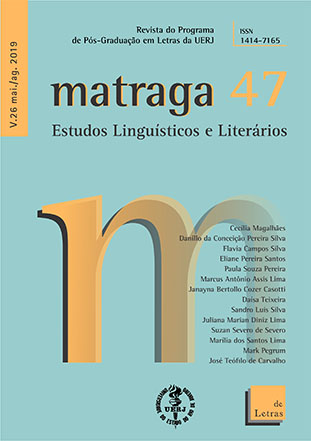Transphobic language practices in cyberspace: pragmatic perspectives on linguistic violence
DOI:
https://doi.org/10.12957/matraga.2019.38340Keywords:
Online Comments. Speech Acts. Transphobia. Linguistic Violence.Abstract
This article discusses digitally mediated linguistic practices engaged in the production of linguistic violence against transsexual, transvestites and transgender people. For this, in line with perspectives of the new Linguistic Pragmatics, especially the recent developments about speech acts, we highlight the particular violent character that some of them may assume as a pragmatic effect produced by the indexical nature of language. In addition, we highlight the specificities of the linguistic practices carried out in cyberspace, related to the semiotic potential of violence in this context. Thus, applying the theoretical discussions undertaken, in the light of a qualitative and interpretative methodology, we analyze two online comments posted by readers of the G1 news page, in matters related to the 19th LGBT Pride Parade in São Paulo, Brazil, in 2015. Finally, we observe the productivity of the pragmatic perspective on language in the understanding of online practices in which it is used with a view to violating people contextually positioned in places subordinated in terms of gender such as trans people and other social markers of difference.
Downloads
Downloads
Published
How to Cite
Issue
Section
License
Authorization
Matraga – Scientific Journal of the Post-graduate Program in Arts and Humanities of UERJ is authorized to publish the article submitted here, if it is accepted for online publication. It is attested that the contribution is original, that it is not being submitted to another publisher for publication, and that this statement is the expression of truth.
The works published in Matraga's virtual space – Scientific Journal of the Post-graduate Program in Arts and Humanities of UERJ will be automatically transferred, and your copyright is reserved to Matraga. Its reproduction, in whole or in part, is conditional on the citation of the authors and the data of the publication.

Matraga uses license Creative Commons - Attribution-Non-Commercial 4.0 International.





